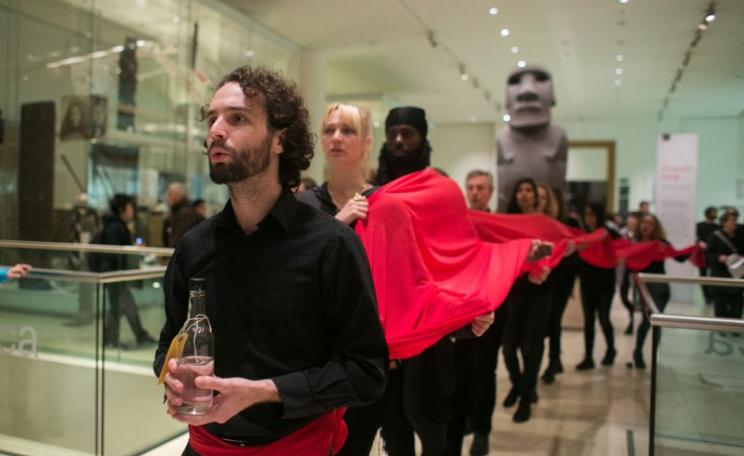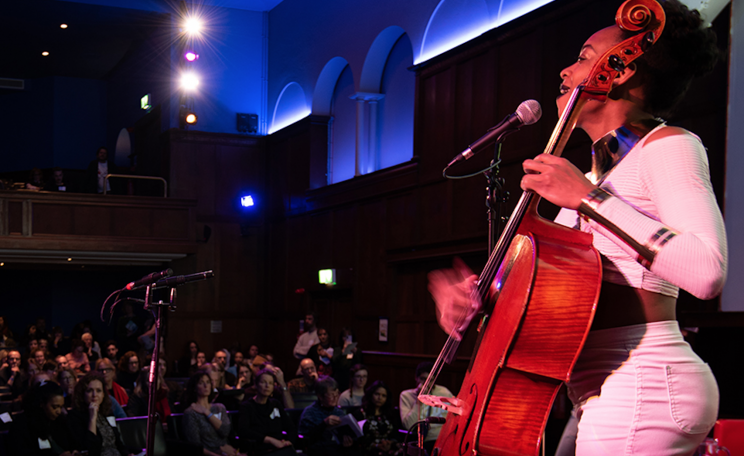As COP23 draws to a close, the environmental community turns to world leaders to provide solutions to the great challenge of our time. Arguing that civic engagement is key, ALISON TICKELL from Julie’s Bicycle reflects on the vital role that the arts sec
For those of us following the climate narrative, it is perhaps only natural to for us to have turned our heads toward Bonn and COP 23 over the last two weeks and placed our faith in this unique conference to provide the leadership and inspiration we need to move towards a society that holds environmental sustainability as a core value.
But what if the key to positive climate action and the leadership we require to implement a global framework of ecological integrity lies embedded in the very fabric of our culture?
What if the solutions we seek to the climate challenge run like a golden thread, weaving through our societies and emerging not simply from individual or even collective action, but in the form of a tectonic shift from within our deeply ingrained cultural narratives?
Constantly trying
Despite an increasing sense of urgency building around the subject, two-thirds of people don't remember ever having a conversation about climate change. Ever. This statistic implies that what we are faced with is not just the task of finding solutions to our climate challenges, but the need to address the cultural climate surrounding environmental action and engagement.
It is difficult to pinpoint exactly what hinders climate progress, but it almost feels that an atmosphere of passivity and disempowerment may have lodged itself into our culture when it comes to the condition of our environment.
Even using the word ‘environment' implies a sense of detachment, as if the natural world is somehow ‘out there', separated and detached from us humans - oddly, ‘nature' doesn't seem to include homo sapiens.
We have yet to embed within our society a cultural narrative of ecology in the purest sense of the word: an unspoken, global agreement and an understanding that all life on Earth interconnects, exists beyond human-made hierarchies and structures, and that every single action we take as individuals, communities and nations will impact the entire ecosystem (including us) as a whole.
In the context of our partnership with Arts Council England and our #COPtimism campaign, which seeks to build on the abundant optimism of the Paris Agreement, we at Julie's Bicycle are constantly trying to think what might be an appropriate response to this question of disconnect between cultural engagement and the climate challenge.
As COP23 draws to a close, the environmental community turns to world leaders to provide solutions to the great challenge of our time. Arguing that civic engagement is key, ALISON TICKELL from Julie’s Bicycle reflects on the vital role that the arts sec
Influence policy
This, then, is where our artists and creatives may hold the key to the great climate issues of our time: by utilising their gifts as storytellers, cultural custodians and curators of our social narratives.
Earlier this month on 7th November, Julie's Bicycle in collaboration with Arts Council England released the Sustaining Great Art report with the latest quantitative and qualitative analysis on Arts Council England's Environmental Programme, which demonstrated not just impressive emissions reductions but also the incredibly inspiring responses of some of England's most iconic arts and culture organisations.
The report found that, not only are more arts organisations involved in the climate movement than ever before, but that the sector's greenhouse gas emissions have reduced substantially in the last five years.
These results are driving a profound transformation in the sector's economy, with the £11 million worth of savings resulting from sustainable initiatives helping to generate new jobs, services and products, all of which is reflected in the way cultural organisations relate to one another.
New artistic and organisational collaborations are springing up and creative climate action is beginning to reach well beyond the cultural sector, even going so as far as to influence policy.
Empathy and cooperation
The range of responses from the sector is both inspiring and ever-growing. They demonstrate the power of planting a small acorn of hope in fertile earth and remind us not to feel overwhelmed by the enormity of our task, but instead to exercise patience and fortitude in encouraging the growth of a flourishing and impactful civic movement.
Even more crucially, the report highlights the vast collection of artistic outputs and responses that are inviting audiences to think about their role in the climate challenge, with 73% of National Portfolio Organisations either already producing or planning to produce work exploring environmental themes.
A recent report from the University of Kent and University of Lincoln demonstrating how arts and culture can promote empathy and cooperation throughout communities, bridging the gap between a person's own experience and the experiences of others.
It then becomes clear that arts and culture have the capacity to influence our perceptions of the natural world, and the responsibilities we bear in creating and upholding an ethical relationship with non-human life on Earth.
Culture and the arts can therefore radically and palpably help to reframe our relationship with our ecology, becoming a crucial stakeholder in the global mission to take positive climate action.
Impact our lives
In a study into the links between climate change narratives and national identity, COIN concluded that, "[to] be effective, mass public communication of climate change needs to be inclusive and speak to people's common sense of belonging".
The artistic and cultural output of any given society has an immense capacity to create, foster and build upon that sense of community and belonging which is so vital to all aspects of sustainable living.
Given that our societies and communities, certainly here in the West, are becoming increasingly divided and isolated from each other, it would seem that the arts sector needs supporting and celebrating for their unique role as cultural hosts and communicators more than ever before.
What is happening across the country - in theatres, venues, festivals and museums, with artists, curators, green champions and chief executives - is itself a rich story that needs to be heard. Climate leadership is in the ascendant; creativity is combining with action to accelerate this exciting movement of change.
Art so often acts as a social commentary and, as environmental sustainability becomes an increasingly necessary aspect of our daily lives, it is vital that art and culture tell the story of climate change and how it can impact our lives.
This Author
Alison Tickell is founder and CEO of Julie's Bicycle (@JuliesBicycle) and can be followed at @JB_Alison





